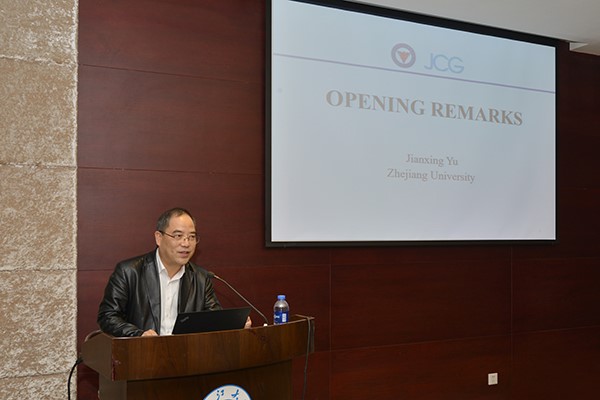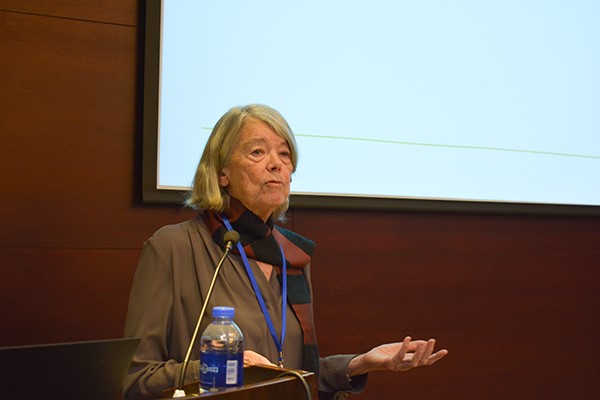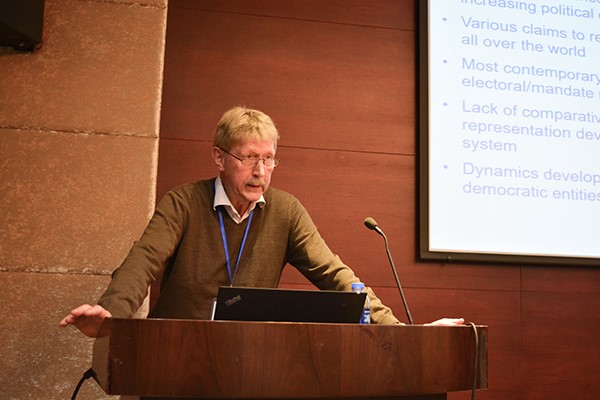Approved by the Ministry of Education, the International Conference “Chinese Governance in Global Context” was successfully held at Zhejiang University on March 22-24, 2019. The conference was hosted by the School of Public Affairs, Zhejiang University and the editorial board of Journal of Chinese Governance (JCG). More than 20 scholars from Harvard University, New York University, Stanford University, University of Duisburg-Essen, University of Tubingen, European University Institute, University of Paris 8, University of Paris 12, University of Oxford, University of Oxford, University of Brasilia, Peking University, Fudan University, Zhongshan University, Tianjin Normal University and Zhejiang University attended the conference.
|
Opening Remarks by Prof. YU Jianxing
Prof. Yu Jianxing, Dean of the School of Public Affairs of Zhejiang University and the editor of JCG gave opening remarks to all the attendees at the conference. Prof. Yu Xunda hosted the conference in the following days as the chair. Prof. Guo Sujian hosted the closing ceremony. A total of 14 research papers were presented and discussed under two main themes: Research on Chinese Governance in the Internet Age and Research on Governance from a Non-Western Perspective”.
Professor Jane Mansbridge of Harvard University explored how to get rid of the crisis of legitimacy by representation institutions’ innovation with the paper entitled “Representation, Legitimacy, and Innovation”. Professor Adam Przeworski of New York University analyzed the representative issues in authoritarian regimes with the paper of Authoritarianism, Authority, and Representation”. Professor Philippe Schmitter of the European University Institute, gave a presentation with the title Crisis and Mutation in the Institutions of Representation in ‘Real-Existing' Democracies, and analyzed the important role of representation in solving predicaments in democracies. Professor Thomas Heberer of the University of Duisburg-Essen used cases study to explore the issue of political representation in different context and presented his findings in the paper“Representation in an Authoritarian Context”. Prof. Yves Sintomer from the University of Paris 8 and PhD Candidate Zhou Yunyun from the University of Oxford jointly reported the paper entitled “Representation in Office: A Comparative Study of Local State – Politicians and Civil Servants in China and France”, showing that the term representation in Chinese and Western political science is not completely synonymous.
| |
Prof. Jane Mansbridge
Prof. Yu Jianxing, researcher Shen Yongdong from Zhejiang University and post doctoral researcher Huang Biao of the National University of Singapore reported on the paper “Representing the Public without Representatives: Digital Representation in the Public Service Delivery of China”. They found that emerging digital technologies help to reduce the limitations of traditional representation institutions, reflect more objectively the potential needs of represented groups, and help governments better respond to them. Professor Tong Dezhi from Tianjin Normal University presented in the paper entitled Democratic Empowerment and Goal of Governance of Grass-roots Deliberation in China that China's widespread urban and rural community deliberation are highly democratic and have shown a new model of democratic governance.Associate Professor Emilie Frenkiel of the University of Paris 12 reported a paper entitled “Representation and Participatory Budgeting: Comparing An Indian and A Chinese Case”, suggesting that participatory budgeting essentially demonstrates representative functions. Dr. Jaclyn A. Kerr from Stanford University gave a report titled The Transforming Role of the Digital in Russian State-Society Relations: Internet Control and Political Representation, pointing out that information technology in the Internet age has unblocked public participation, which also portrayed the relationship between the state and society to a certain extent. Professor Debora Rezende de Almeida of the University of Brasilia gave a report entitled Digital Accountability: Brazilian Participatory Institutions”, exploring social media’s role as a new platform for the expression of the interests of diverse groups and social movements. Researcher Wang Zhongyuan of Fudan University gave a presentation entitled “Consultative Representation: How Chinese Authorities Enhance Political Representation by Public Consultation”, discussing that China's experience has spawned an important perspective to understand “political representation beyond the electoral framework”. Professor Thomas Heberer of Duisburg-Essen University and post-doctoral researcher Anna Shpakovskaya jointly reported a study entitled Connective Representation in the Cyberspace: The Case of China's Entrepreneurs, arguing that the rapid spread of new information and communication technologies lead to a fundamental shift in political representation. Professor He Junzhi from Sun Yat-Sen University gave a report entitled “The Reelection Model for Chinese National People’s Congress”, which deepened the understanding of China’s political development from the perspective of institutionalization of legislation. Associate Professor Zhang Changdong of Peking University gave a report entitled Taxation without Representation: Chinese Citizens' Tax Awareness”, measuring Chinese citizens’ tax awareness and equity from different aspects.
|
Prof. Thomas Heberer
The conference focused on the concept of “representation” in governance theory, comparing governance theories and practices of China and other countries in a global perspective with the background of the Internet era. Participants discussed the issue of representative forms and contexts extensively and deeply, which opened up new ideas and new directions for future Chinese governance research.





